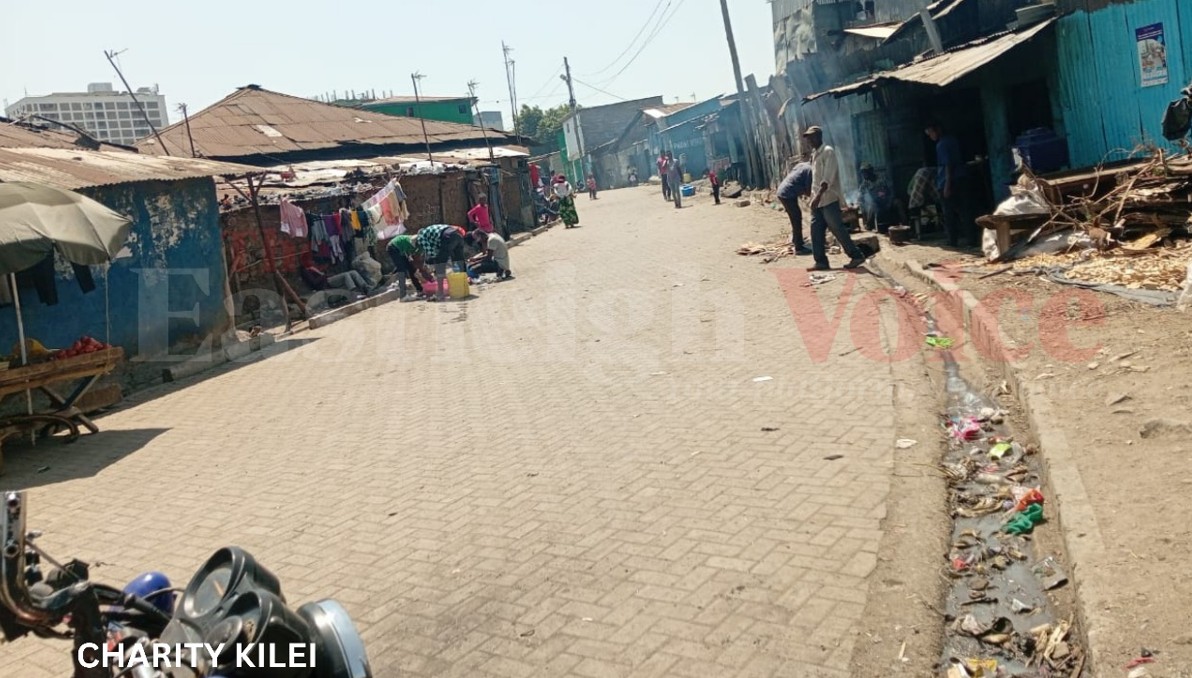Paved road brings new life to Kamukunji’s Kitui village, residents push for street lights next

While informal settlements often grapple with numerous challenges, even modest infrastructure improvements can have a profound and lasting impact. That’s exactly what has happened in Kitui village, a neighbourhood in Nairobi’s Kamukunji Constituency.
Once associated with crumbling infrastructure, insecurity, and poor accessibility — especially during emergencies — the area is now quietly transforming how residents live, work, and move.
Mohammed Oyando Kuteha, a long-time resident, has seen the changes unfold before his eyes. He remembers a time when fear forced people to shut down their businesses by 7 p.m.
“There were a lot of potholes, and the road was very narrow,” he recalls. “Pickpockets would easily hide among the cluttered kiosks and dark corners. Even though the area had police patrols, it was hard to feel safe.”
Kuteha says criminals exploited the congested paths to vanish quickly, leaving residents constantly on edge. Movement after dark was rare, and the lack of accessible roads often delayed emergency services — a problem that, in the past, had tragic consequences during fires and other crises.
That began to change just three months ago when a government initiative expanded and paved the main road through Kitui village.
Cabro-paved road
For the first time in years, residents saw a proper cabro-paved road laid through the neighbourhood, linking it directly to major access routes that lead to the busy Gikomba Market and other commercial areas.
“Everything has changed,” Kuteha says. “The road now connects us directly to the main road, and criminals can no longer hide. Insecurity has dropped, and people feel safer walking even at night.”
However, he notes one concern that still lingers — the lack of street lighting.
 Mohammed Kuteha says the new road has improved safety in Kitui village but calls for street lighting to curb crime. (Photo: Charity Kilei)
Mohammed Kuteha says the new road has improved safety in Kitui village but calls for street lighting to curb crime. (Photo: Charity Kilei)“We’re grateful for the road, but we need proper security lighting. Darkness encourages crime. If we can remove the darkness, we’ll solve most of the insecurity issues for good.”
Beyond improving safety, the new road has also breathed new life into the local economy.
Mary Sindoli, a vegetable vendor who works along the upgraded road, says the changes have brought more customers, smoother movement, and longer business hours.
“Before, I had to close by 7 p.m.,” she says. “Now I stay open until 10 p.m. because people feel safe walking at night. The road is busy, even after dark. There are more customers, more traders, and more confidence.”
She also highlights that the improved road has made it easier to reach Gikomba Market early in the morning — a crucial time for buying fresh produce in bulk.
“Now I leave home as early as 4 a.m. to get the best vegetables, and I don’t worry about being mugged. That wasn’t possible before. We just need the county to install streetlights to make it even better.”
Sindoli adds that the road has helped reduce flooding during the rainy season, which used to damage goods and stalls, and drive customers away.
Her earnings, once unpredictable, have stabilised. She now makes around Sh500 daily, thanks to increased foot traffic and easier access for vehicles.
Opened new doors
For Rose Wavinya, a resident and budding entrepreneur, the road opened a door she hadn’t imagined. With more people passing through, she launched a small avocado business, selling to commuters and traders heading to Gikomba.
“Before the road, there was no space to move,” she says. “The area was so cramped. Now it’s open and clean. More people pass by, and I get more customers. It’s helping me earn something daily.”
She, too, stresses the need for lighting, particularly for women and children who still feel uneasy navigating unlit paths after dark.
“The road helps in many ways, even during emergencies. Before, fire trucks couldn’t reach us. In a fire last year, we lost seven lives because firefighters were delayed. This road came at the right time. We just need the lighting to complete the progress.”
 Vendors are now lining the newly paved road in Kitui village, taking advantage of increased foot traffic and improved safety to grow their businesses. (Photo: Charity Kilei)
Vendors are now lining the newly paved road in Kitui village, taking advantage of increased foot traffic and improved safety to grow their businesses. (Photo: Charity Kilei)The benefits of the new road extend far beyond safety and commerce. Residents say it has restored a sense of dignity to the area. Children now play freely.
Parents feel more comfortable letting them walk to nearby kiosks or schools.
Women traders are earning more and staying open later. Motorbikes, tuk-tuks, and delivery vehicles now move through the area with ease, improving transport and logistics.
For many in Kitui Village, the road is more than just an upgrade — it’s a lifeline. It has transformed how people move, do business, and connect with one another and their surroundings.
The improvement has also sparked a sense of community pride.
Residents are now organising regular clean-up drives, and there’s growing interest in launching a night market — something unimaginable just months ago.
Still, residents agree that more needs to be done.
The top concerns now include the lack of security lighting, proper drainage, and reliable waste management.
Many believe that addressing these remaining needs will help cement the positive changes and ensure the transformation is truly lasting.
Let’s Connect
We’re here to listen, support, and engage with you.
Whether it’s feedback, a request, or collaboration — Hon. Yusuf Hassan’s team welcomes your message.
Office Address
Kamukunji Constituency Office, Nairobi
Call
+254 737 500200, +254 716 667733
“Leadership is not about position — it’s about purpose, people, and progress.”